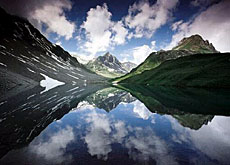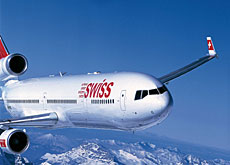Travel industry proves resistant to crises

The Iraq war and the Sars scare have had less of an impact on the Swiss tourist industry than had been expected.
As the winter season came to an end, business hotels reported being hard hit but the rest of the industry is proving resistant to the crises.
From the swimming pool on the top floor of the swissôtel Zurich, guests can see planes taxiing onto the runway at the city’s international airport.
About 80 per cent of the hotel’s guests are business travellers, including the crews of international airlines flying into Zurich.
The hotel also houses the largest convention centre in the city. But business is bad.
“About four or five years ago, our occupancy rates averaged 85 per cent. Those were the good years,” swissôtel director, Rainer Tenius, told swissinfo.
“Last year the rate dropped to 65 per cent and we’ll be lucky if we reach 60 per cent this year,” he added.
Iraq and Sars
The Iraq war, outbreak of the deadly Sars virus, and continuing global economic slump have had a crippling effect on world travel.
Companies are cutting costs by slashing the number of business trips, and tourists frightened by the Iraq war and Sars are staying at home.
This has forced airlines including Swiss (see related story) to cancel flights on several routes.
Hotel figures
Michel Ferla, an executive with Switzerland Tourism, the Swiss travel industry’s marketing body, agrees that business travel has been devastated but is buoyed by the latest hotel figures – which take into account both business and holiday hotels.
The number of overnight stays in Swiss hotels from December through March was down only two per cent on the same period last year, but above the average of the past ten years.
“You also have to take into account the importance of holiday apartment rentals, which aren’t included in the figures,” Ferla said.
They account for more than half of all overnight stays.
“Last year the apartment figures were better than the hotels which made the overall decrease lower.”
Holidays at home
Ferla said the Swiss themselves had helped make up for the drop in foreign guests by spending more money on holidays at home.
This is reflected in the excellent results posted by the Swiss cable car companies.
From the start of the ski season in mid-December to the end of March, the cable cars boosted revenue by eight per cent.
Going up
“We didn’t have many customers from overseas this year but we more than made up for their absence with an increase from Switzerland, Germany, Holland and France,” said Felix Maurhofer of the Association of Swiss Cable Car Companies.
These skiers were not only attracted by the proximity of Switzerland but by the best snow conditions in the Swiss Alps for years.
Maurhofer said the cable car sector could show symptoms of the Sars crisis this summer.
“We don’t think it will be very good because our summer business depends a lot on Asian tourists and we don’t expect that they will come,” he said.
Ferla says that could result in the number of summer visitors dropping between three and five per cent compared to last year.
Summer campaign
To counter the malaise, Switzerland Tourism is preparing to launch a major campaign to promote the summer season in the two countries which matter most to the Swiss tourist industry – Switzerland and Germany.
The two countries on average account for well over half of all tourists.
The campaign could be given an additional boost if the euro – currently at its highest level ever against the franc – remains strong.
Last week, the euro broke the symbolic SFr1.50 level, and at that rate holidays in Switzerland will be on average 15 per cent cheaper than they have been over the past couple of years.
As far as business travel is concerned, Ferla is optimistic that most firms are simply postponing international meetings and conventions, and that this segment of the market will soon rebound.
The swissôtel Zurich is counting on it. The hotel’s owner, Raffles International, is pumping millions of francs into the building to modernise its rooms and to keep its convention centre state of the art.
swissinfo, Dale Bechtel
Swiss tourists make up about half of all hotel guests.
Germans are second – accounting for 17 per cent.
Travellers from the United States make up about five per cent, and those from all Asian countries about six per cent.
Business travel in Switzerland has been hit hardest by the decline in tourism caused by the Iraq war and the Sars outbreak.
The rest of the industry has proven resistant, with Swiss and tourists from neighbouring countries making up for the decline in overseas visitors.
Overnight stays in Swiss hotels from December through March were down by two per cent compared with last year, but the figures were above the average of the last ten years.
Cable car companies saw a rise in revenues this winter of eight per cent due to an increase in Swiss visitors and guests from western Europe, who preferred a holiday closer to home and were attracted by the excellent skiing conditions.

In compliance with the JTI standards
More: SWI swissinfo.ch certified by the Journalism Trust Initiative


You can find an overview of ongoing debates with our journalists here. Please join us!
If you want to start a conversation about a topic raised in this article or want to report factual errors, email us at english@swissinfo.ch.